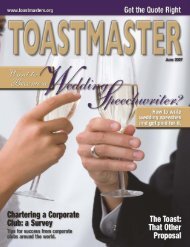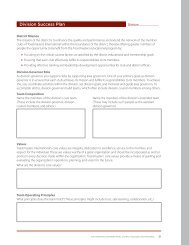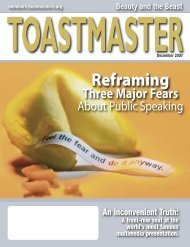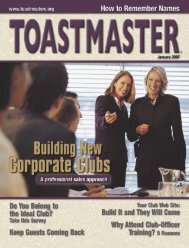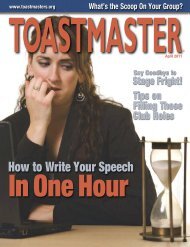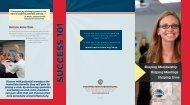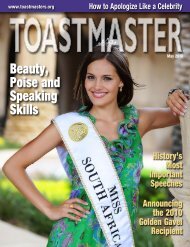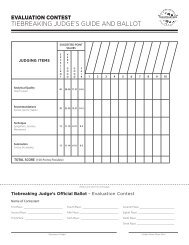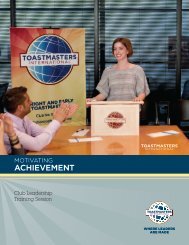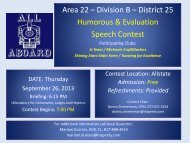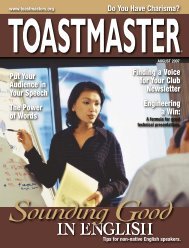September 2011 - District 25 Toastmasters
September 2011 - District 25 Toastmasters
September 2011 - District 25 Toastmasters
You also want an ePaper? Increase the reach of your titles
YUMPU automatically turns print PDFs into web optimized ePapers that Google loves.
MANNER OF SPEAKING<br />
DISTANCE MAKES<br />
THE WORDING WANDER<br />
Do you know the differences between<br />
British and American grammar<br />
By Jenny Baranick<br />
In the early 1600s, the pilgrims<br />
fled from England to America<br />
in pursuit of religious freedom.<br />
However, I have a theory: I believe<br />
they were also after linguistic freedom.<br />
Once those pilgrims arrived in<br />
the New World, they went wild with<br />
the English language: Colour became<br />
color, centre became center and analyse<br />
became analyze. No longer did<br />
people ring their mates on the phone;<br />
they called their friends. They didn’t<br />
put groceries in the boot of the car;<br />
they put them in the trunk.<br />
What’s that, you say Pilgrims<br />
didn’t have phones or cars Okay,<br />
maybe the English language didn’t<br />
change the instant the first English<br />
settlers disembarked from the<br />
Mayflower, but in the past 400<br />
years, disparities have arisen between<br />
British and American English, not<br />
only with regard to word choice, but<br />
also grammar. The differences between<br />
British and American English<br />
grammar are subtle but important to<br />
recognize – or recognise.<br />
First of all, British English is more<br />
perfect than American English. Calm<br />
down, Americans – I don’t mean that<br />
it’s better: British English speakers<br />
simply use the present perfect tense<br />
(have/has + past participle) when expressing<br />
a past event that has current<br />
consequences. Americans will also use<br />
the present perfect under the same<br />
circumstances, but unlike the British,<br />
they also use the simple past, which<br />
is used to indicate that an action happened<br />
at a specific time in the past.<br />
For example, let’s say that currently<br />
I have a sweet tooth (which I do); if<br />
I asked an American, “Can I have a<br />
cookie” he or she might answer in<br />
one of the two following ways:<br />
In the simple past:<br />
I ate the last one.<br />
Or in the present perfect:<br />
I have eaten the last one.<br />
If I asked a Brit the same question<br />
– although, I would ask for a biscuit<br />
rather than a cookie – he or she<br />
would most likely use the present perfect.<br />
Either way, I still want the cookie.<br />
Another difference is British English<br />
makes more ado about do than<br />
American English. For example, if<br />
an American asked a Brit whether he<br />
or she would be attending a party, a<br />
likely response would be “I might do.”<br />
An awkward silence would then ensue<br />
until the American finally asked,<br />
“You might do what” That’s because<br />
in British English do is often used as a<br />
substitute for a verb when replying to<br />
a question, while in American English,<br />
it’s not. If an American were asked the<br />
same question, he or she would probably<br />
answer, “I might” or “I might<br />
go.” The same applies for the past<br />
tense. If a Brit were told, “Make sure<br />
you RSVP,” he or she would likely<br />
answer, “I already have done,” while<br />
an American would simply answer,<br />
“I already have.”<br />
This next difference between<br />
American and British English should<br />
be easy to remember, considering<br />
tea is England’s number one drink.<br />
Not only do the British have a tea<br />
culture, they have a t culture. Brits<br />
tend to opt for the irregular past<br />
tense form of verbs, which ends in<br />
t, while Americans tend to use the<br />
regular past tense form, which ends<br />
in ed or d. The following verbs can<br />
take either the regular or irregular<br />
verb ending: burned/burnt, dreamed/<br />
dreamt, leaned/leant, smelled/smelt,<br />
spilled/spilt and spoiled/spoilt.<br />
Therefore, if a Brit spilt some milk,<br />
an American would have learned not<br />
to cry over it.<br />
Despite these subtle differences,<br />
Brits and Americans do have one<br />
important thing in common when<br />
it comes to grammar: the need to<br />
improve their grasp of it. Studies<br />
from both countries show that jobseekers<br />
and corporate employees lack<br />
the grammatical and communication<br />
skills needed to create the emails,<br />
reports and presentations required<br />
by most careers. So, whether you’re<br />
American or British, in order to land<br />
that job interview or get that promotion,<br />
make sure you listen carefully<br />
to the grammarian’s report in your<br />
<strong>Toastmasters</strong> club meeting. Then<br />
practice, practice, practice – or<br />
practise, practise, practise! T<br />
Jenny Baranick is an English professor<br />
based in Southern California.<br />
Reach her at jbaranick@gmail.com.<br />
TOASTMASTER SEPTEMBER <strong>2011</strong><br />
15



